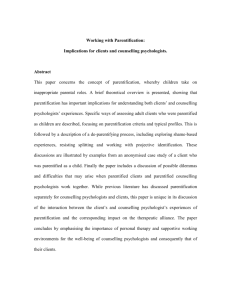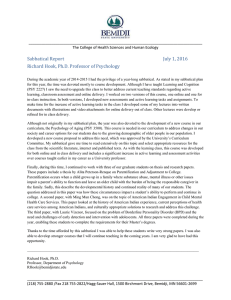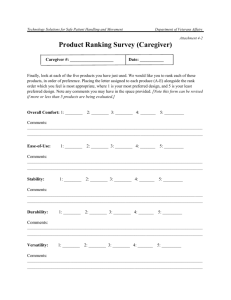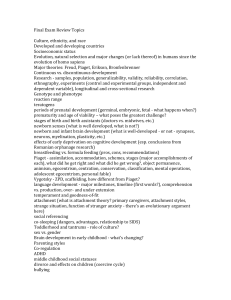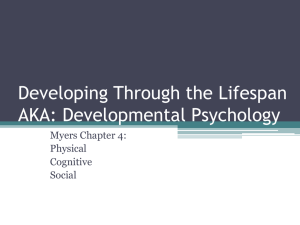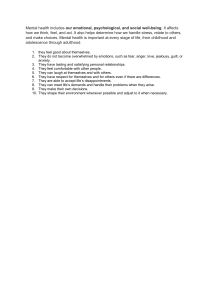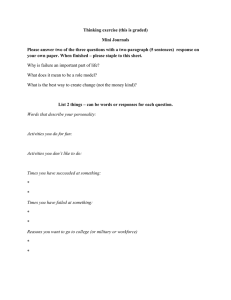Effects of Parentification: Long-Term Impacts on Children
advertisement
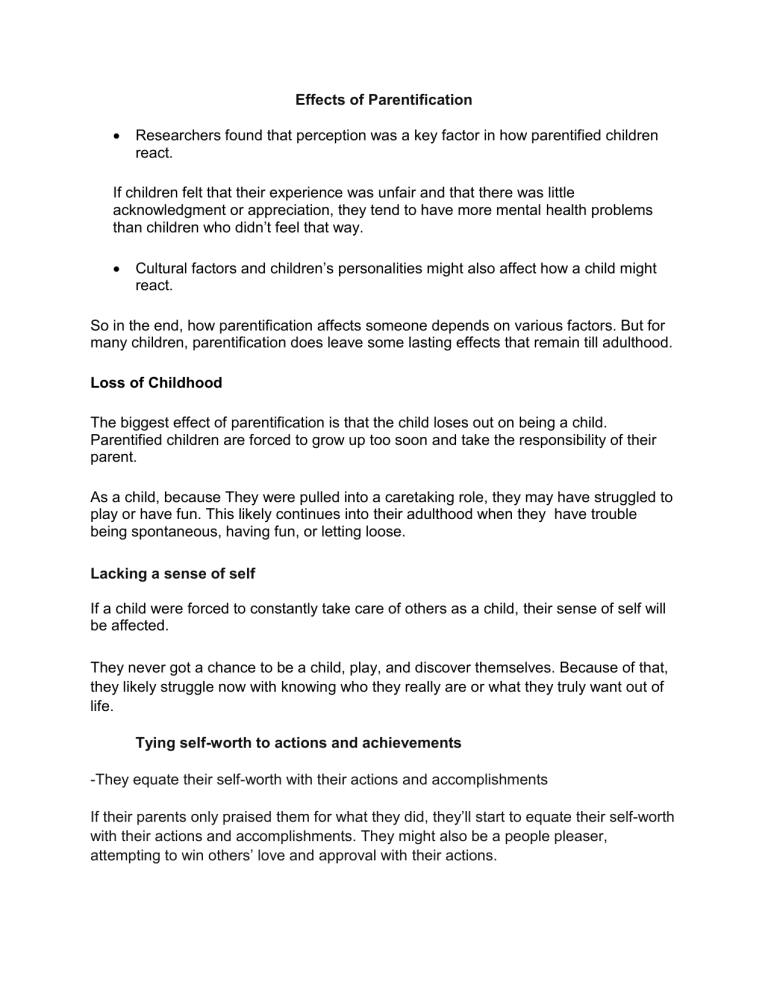
Effects of Parentification Researchers found that perception was a key factor in how parentified children react. If children felt that their experience was unfair and that there was little acknowledgment or appreciation, they tend to have more mental health problems than children who didn’t feel that way. Cultural factors and children’s personalities might also affect how a child might react. So in the end, how parentification affects someone depends on various factors. But for many children, parentification does leave some lasting effects that remain till adulthood. Loss of Childhood The biggest effect of parentification is that the child loses out on being a child. Parentified children are forced to grow up too soon and take the responsibility of their parent. As a child, because They were pulled into a caretaking role, they may have struggled to play or have fun. This likely continues into their adulthood when they have trouble being spontaneous, having fun, or letting loose. Lacking a sense of self If a child were forced to constantly take care of others as a child, their sense of self will be affected. They never got a chance to be a child, play, and discover themselves. Because of that, they likely struggle now with knowing who they really are or what they truly want out of life. Tying self-worth to actions and achievements -They equate their self-worth with their actions and accomplishments If their parents only praised them for what they did, they’ll start to equate their self-worth with their actions and accomplishments. They might also be a people pleaser, attempting to win others’ love and approval with their actions. Their self-worth might be tied directly to what they can provide to others and how “good” they are. Compulsory Caregiving & Working Growing up, you might feel like your parents or siblings can’t survive without you, that they need you. So you might’ve been compelled to keep caring and working for your family even if it hurts them. Now as an adult, being a caretaker feels good to you. Even when you’re neglecting yourself or sacrificing parts of yourself in the process. You might tend to overwork to fulfill responsibilities that you keep piling onto your plate. Anxiety Anxiety is common among parentified children, particularly anxiety over abandonment, loss, and caring for others. Parentified children in adulthood also tend to excessively worry over their responsibilities. Self-Blame, Guilt, & Shame Parentified children may believe it’s their fault that bad things happen in the family. They may feel responsible for their family’s happiness, health, and overall well-being. They may blame yourself for everything that goes wrong, assuming responsibility for other people’s dysfunctions or misfortunes. And this self-blame likely results from their need to feel in control. But none of it was your fault. You were just a child. You were not responsible for your parents. On the flip side, they were the ones responsible for you and your well-being. Self-Criticism & Judgment They are likely highly judgmental and critical of themsellves, sensitive to any mistakes or errors they may because anything that goes wrong is their responsibility You might think you’re not good enough. Or feel like you’re not doing things correctly or perfectly enough. Making a mistake or error might cause them to feel like a failure. You might think you’re unacceptable without something impressive to show. Rather than live by standards set by the real you, you live according to standards set by others instead. Related: Reminders for When You Think You’re Not Good Enough Seeing own needs as a burden You might be sensitive and empathetic to others’ needs, but not so much to your own. So you might tend to put others’ needs above your own. You might even see or feel like your own needs are a burden to others. Social Isolation Many parentified children lose their real position in the family unit. Because instead of being a child, siblings or anak they take the role of their parents. Thus, they end up lonely and unsure about where they belong or who they are. This likely continues into adulthood, causing a form of loneliness and social isolation, which also links to interpersonal problems. Emotional Suppression Parentifying parents express their emotions and lean on their children for support. Meanwhile, their children aren’t allowed to do the same. They feel that they have to be strong for their parents, they may tend to bury anger, resentment, and grief. This emotional suppression can cause somatic symptoms, psychological disorders, chronic diseases, or emotional outbursts. Emotional outbursts can affect their ability to form relationships, sustain a career, or feel stable in life. It can also lead to aggression or violence once na napuno na sila Other lasting effects Childhood abuse, such as parentification, can cause a lot of other long-lasting effects such as substance use, physical symptoms, chronic diseases, and psychological disorders. Learn more: 30 Long-Lasting Effects of Child Abuse in Adulthood Long-term effects of parentification Adults who were parentified as children may want to know how this is affecting their lives. Let’s look at the challenges and then at the benefits. Challenges Relationships Building your relationship with a primary caregiver is a key task in child development. This is known as attachment. Secure attachment with a caregiver gives a child a sense of security, well-being, and self-esteem. A positive relationship also provides an internal working model for future relationships. Parentification can lead to insecure attachment and this, in turn, can negatively affect future relationships. As an adult, a parentified child may have challenges trusting others and prefer to be self-reliant. They may engage in unhealthy relationships and assume a caregiving role even when they don’t want to because this is the role that they know how to play. They may worry about being abandoned. Research in 2019Trusted Source suggests parentification may be intergenerational. This means that the effects are carried over to the next generation. It may affect parenting skills and make parents less responsive to their children’s needs. This, in turn, makes children less compliant toddlers. Adults who were parentified may try to compensate for their childhood losses by having their own children fill their emotional needs. Interpersonal Problems Building a relationship with their primary caregiver is important for child development. Secure attachment gives a child a sense of security, well-being, and self-esteem. It also determines the child’s future relationships as an adult. Parentified children as adults may have attachment and abandonment issues. They may also have difficulty handling rejection and disappointment within their interpersonal relationships. Also, you might’ve relied on yourself so much that you might have trouble trusting others. You might also take on a caregiving role you might not necessarily want because it’s the only role you know. Physical and mental health According to a 2018 study, having adverse childhood experiences increases the likelihood that you’ll develop both mental and physical health issues. Benefits Parentification may have its benefits, though of course these represent a silver lining rather than a justification. For example, if you were parentified as a child and perceived the relationship as positive — and if your efforts were rewarded in some way — you may find that being a caregiver has given you an extra dose of empathy that helps you build strong relationships. You may have a good sense of who you are and what your strengths are. And if you cared for your sibling, you may have a friend and special closeness for life. The Difference Between Parentification and Healthy Connection To be clear, it’s not always a bad thing for a parent to talk to a child or teen about what they’re feeling, in age-appropriate ways. In fact, kids may feel confused or blame themselves if they know a parent is unhappy but don’t understand what’s making them sad. But the parent should not look to the child for help in coping with their emotions. Furthermore, it’s fine for kids to help out around the house or care for younger siblings sometimes, or even for a parent if they are briefly unwell. In fact, taking on family responsibilities—in appropriate measure—can give a child a sense of satisfaction and competence. However, helping out at home should not be at the expense of a child’s or teen’s emotional or physical health. Nor should it disrupt their academic studies, peer relationships, or the other “work” of growing up. In summary, children should never feel that they are responsible for keeping their parents happy or keeping the family safe. Links: https://www.healthline.com/health/parentification https://hopefulpanda.com/parentification/
